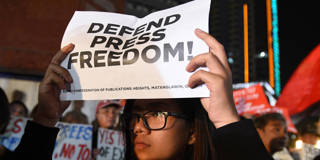Following the gruesome 2018 murder of journalist Jamal Khashoggi, the United Kingdom provided much-needed moral leadership by launching a global campaign to promote media freedom. But the UK’s decision to invite the Saudi Crown Prince, who is suspected of ordering the murder, devalues the efforts of all who supported the campaign.
LONDON – In July 2019, the United Kingdom’s foreign secretary, Jeremy Hunt, launched a global campaign for media freedom at a London conference co-organized by the Canadian government. “Today, we are joined by delegations from over 100 countries … never before have so many countries come together in this cause,” he proudly announced. The event established the Media Freedom Coalition, and more than 50 countries have since joined.
The impetus behind the media-freedom initiative was the October 2018 assassination of Saudi journalist Jamal Khashoggi in the Saudi consulate in Istanbul. Khashoggi’s gruesome murder was a state-sanctioned killing orchestrated by individuals at the highest echelons of the Saudi regime. In the wake of his death, media freedom quickly rose to the top of the UK government’s foreign-policy agenda.
The media-freedom campaign represented a rare lull in the tense geopolitical climate that followed the 2016 Brexit referendum and the election of US President Donald Trump. It also offered a unique opportunity for the UK to provide genuine leadership on an issue that the international community had largely overlooked.

LONDON – In July 2019, the United Kingdom’s foreign secretary, Jeremy Hunt, launched a global campaign for media freedom at a London conference co-organized by the Canadian government. “Today, we are joined by delegations from over 100 countries … never before have so many countries come together in this cause,” he proudly announced. The event established the Media Freedom Coalition, and more than 50 countries have since joined.
The impetus behind the media-freedom initiative was the October 2018 assassination of Saudi journalist Jamal Khashoggi in the Saudi consulate in Istanbul. Khashoggi’s gruesome murder was a state-sanctioned killing orchestrated by individuals at the highest echelons of the Saudi regime. In the wake of his death, media freedom quickly rose to the top of the UK government’s foreign-policy agenda.
The media-freedom campaign represented a rare lull in the tense geopolitical climate that followed the 2016 Brexit referendum and the election of US President Donald Trump. It also offered a unique opportunity for the UK to provide genuine leadership on an issue that the international community had largely overlooked.